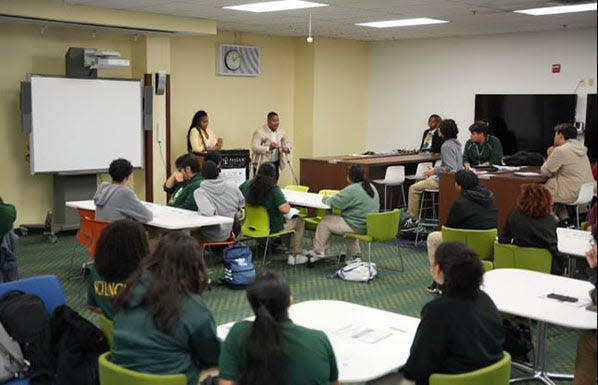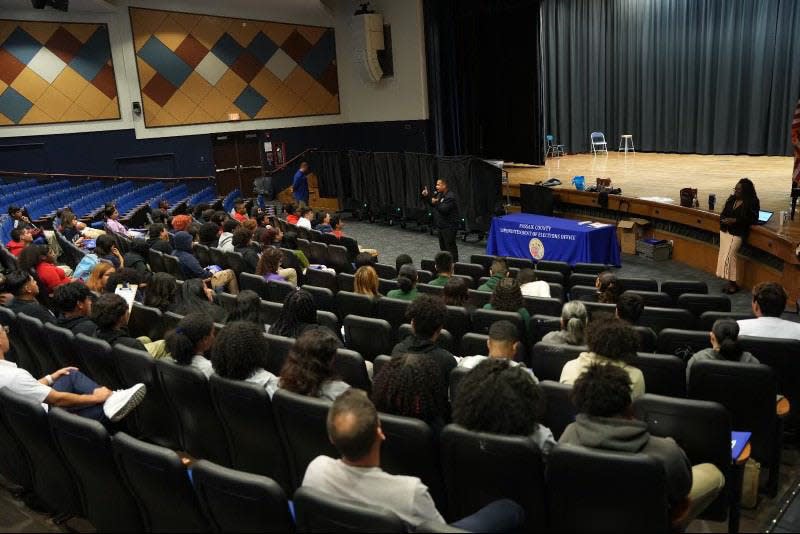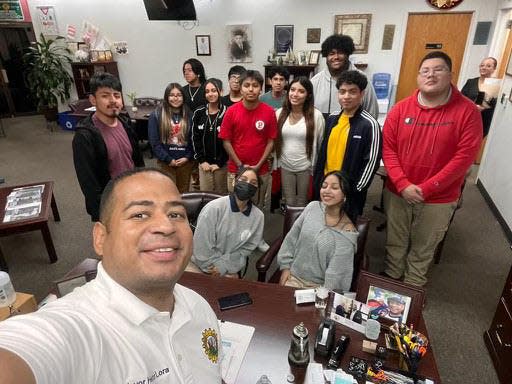Passaic tapping high school seniors to fill a need: election poll workers
Poll workers, especially in the current electoral atmosphere, are in short supply nationwide, but the city of Passaic thinks it has found a solution to minimize the ongoing shortage: high school seniors.
After recently reaching out to local high school students, about 60 expressed an interest in training to become election workers. The first class was held Wednesday.
Dillon Roldan, Alexa Moreno and Itzel Ramos were three among the first 13 Passaic high school students on hand Wednesday to receive election worker training at City Hall.
The training is part of Mayor Hector Lora's novel approach to addressing a long-standing problem, not just in his city but nationwide: a shortage of election workers. Wednesday's class was the first of four one-day classes.
More: Struggling to hire enough officers, Clifton agrees to increase size of Police Department

The training requires taking a 2½-hour course. Three other classes with 17, 12 and 10 seniors expected to attend will be held in the next week, and if they all compete the program it will add about 50 election workers.
For Roldan and company, it is an opportunity to pad their resumes and earn a few bucks. Election workers get paid $300 for working on Election Day and $21.83 an hour for in-person early voting days.
"Yeah, the money is nice," Roldan said. "It should help on a college application." He is applying to get into the New Jersey Institute of Technology.
Ramos said she is hoping to hone her people skills by working with a diverse population and helping them navigate the polls.
"It's an opportunity to meet and talk with people in my community," she said.
For City Clerk Weatherly Frias, any extra workers will be appreciated.
She said the city requires a minimum of 180 poll workers for each election. Ideally there also are a dozen or more standby workers to account for any unforeseen absences after poll workers have been assigned.

At times the city needs to bring in workers from other jurisdictions.
"We often face a shortage of available and trained workers for the primary and general elections, because those workers typically will be assigned to their own municipalities," Frias said. "Our city has had a challenge getting more applicants trained and available in our own municipality for those elections."
Earlier this year, Frias noted, during a discussion about a shortage of board workers, Lora suggested tapping 18-year-old students from Passaic to bridge this gap.
"Promptly acting on his suggestion, we assessed its practicality and set the wheels in motion for this initiative," she said.
Lora and aides went out recently to the the city's high schools to try to convince students to join up. About 60 showed an interest.
The mayor said he hopes the city program will catch on. For one thing, it strengthens students' sense of civic duty, and at the same time it addresses a real need in terms of quality employees on Election Day.
If successful, it could provide an additional worker pool throughout the county and state and maybe even nationwide, the mayor said.
According to the U.S. Election Assistance Commission, in the 2020 election, there were more than 130,000 polling places nationwide, requiring almost 800,000 workers to staff them.

The same study noted that it is in more densely populated areas that finding workers is the most challenging. For Passaic's mayor, it affords the city an additional way to help kids.
"One of the key aspects of this initiative is that participating students will receive compensation of $300 per day," Lora said, "providing them with extra cash for the holidays and the opportunity to help their families with bills, promote college savings, or fulfill other financial needs."
There's also a direct benefit to the community, as the students involved can assist seniors with evolving voting technologies and bridge language barriers.
"Our students can bridge this gap and ensure that everyone has the opportunity to exercise their right to vote and have a pleasant experience doing so," Lora said.
He also hopes to be able to link the program with the existing state law that allows for college credits for those who work the polls, to a maximum of three credits.
That may be harder to achieve. While Steve Rose, president of Passaic County Community College, applauds the program, he added that it may be hard to marry the election worker program with a given course. It has to match up with some of the college's existing courses.
Lora said he hopes to keep pressing for the state to require New Jersey colleges to grant college credits for high school students who work an election.
This article originally appeared on NorthJersey.com: Passaic training high school seniors to work on Election Day

